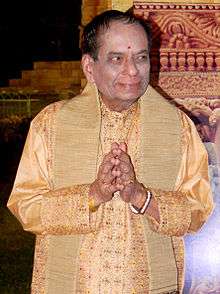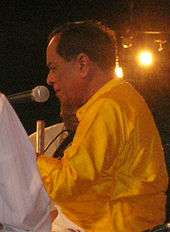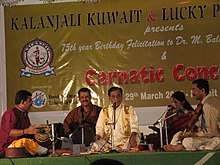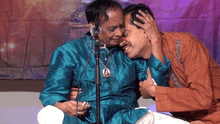M. Balamuralikrishna
Mangalampalli Balamuralikrishna (Telugu: మంగళంపల్లి బాలమురళీకృష్ణ; 6 July 1930 – 22 November 2016) was an Indian Carnatic vocalist, musician, multi-instrumentalist, playback singer, composer, and character actor.[1][2] He was awarded the Madras Music Academy's Sangeetha Kalanidhi in 1978. He has garnered two National Film Awards (1976, 1987), the Sangeet Natak Akademi Award in 1975, the Padma Vibhushan, India's second-highest civilian honor in 1991, for his contribution towards arts, the Mahatma Gandhi Silver Medal from UNESCO in 1995, the Chevalier of the Ordre des Arts et des Lettres by the French Government in 2005, the Sangeetha Kalanidhi by Madras Music Academy, and the Sangeetha Kalasikhamani in 1991, by the Fine Arts Society, Chennai to name a few.[3]
Dr. M. Balamuralikrishna | |
|---|---|
 Balamuralikrishna at Rajarani Music Festival, Bhubaneswar, Odisha | |
| Background information | |
| Birth name | Mangalampalli Balamuralikrishna |
| Born | 6 July 1930 Sankaraguptam, East Godavari District, Madras Presidency, British India (now part of Andhra Pradesh, India) |
| Died | 22 November 2016 (aged 86) Chennai, Tamil Nadu, India |
| Genres | Carnatic music |
| Occupation(s) | Musician |
| Instruments | Viola Mridangam Kanjira |
| Years active | 1938–2016 |
Balamuralikrishna started his career at the age of six. In his life-time, he gave over 25,000 concerts worldwide.[4] Apart from Pandit Bhimsen Joshi, he presented jugalbandi concerts (duets) with Pandit Hariprasad Chaurasia, Pandit Ajoy Chakrabarty and Kishori Amonkar, among others. He is also known for popularizing the compositions of Sri Bhadrachala Ramadasu, Sri Annamacharya, and others.
Balamuralikrishna's concerts combined sophisticated vocal skills and rhythmic patterns of classical music with the popular demand for entertainment value. Balamuralikrishna presented concerts in many countries, including the US, Canada, UK, Italy, France, Russia, Sri Lanka, Malaysia, Singapore, countries in the Middle East, and elsewhere. Apart from his native tongue, Telugu, he has also composed in other languages including Kannada, Sanskrit, Tamil, Malayalam, Hindi, Bengali, and Punjabi.[5]
He appeared as a featured soloist with an award-winning British choir, performing the "Gitanjali Suite" with words from Rabindranath Tagore's Nobel Prize-winning poetry and music by "Dr. Joel", the noted UK-based Goan composer. His clear diction in several languages prompted an invitation to record Tagore's entire Rabindra Sangeet compositions in Bengali, preserving them for posterity. He had sung in French, and even ventured into jazz fusion, collaborating with the top Carnatic percussion teacher, Sri T.H. Subash Chandran, in a concert for Malaysian royalty.
Early life

Balamuralikrishna was born in Sankaraguptam, East Godavari District, Madras Presidency (now a part of Andhra Pradesh state).[6] His father was a well known musician and his mother was a veena player. Balamuralikrishna's mother died when he was an infant and he was raised by his father. Observing his interest in music, his father put him under the tutelage of Parupalli Ramakrishnayya Pantulu, a direct descendant of the shishya parampara (lineage of disciples) of Tyagaraja.[7] Under his guidance, the young Balamuralikrishna learned Carnatic music. At the age of eight, he gave his first full-fledged concert at a Thyagaraja Aradhana in Vijayawada. Musunuri Suryanarayana Murty Bhagavatar, a Harikatha performer, saw the musical talent in him and gave the prefix "Bala" (lit. child) to the young Balamuralikrishna.[8] (Prior to this, his name was Muralikrishna; following Bhagavatar's addition of the prefix, he began to be known as Balamuralikrishna.)
Having begun his musical career at a very young age, by age fifteen he had mastered all the 72 melakartha ragas and had composed krithis in each of them. His Janaka Raga Manjari was published in 1952 and recorded as Raagaanga Ravali in a nine-volume series by the Sangeeta Recording Company.[9] Not merely content with his fame as a Carnatic vocalist, he also played the kanjira, mridangam, viola, and violin.[10][11][12] He accompanied various musicians on the violin. He also presented solo viola concerts.He was the person who introduced viola to classical Indian music. [13][14]
Experimentation

Characteristic of Balamuralikrishna's musical journey have been his non-conformism, spirit of experimentation, and boundless creativity. Balamuralikrishna has experimented with the Carnatic music system by keeping its rich tradition untouched. Ragas such as Ganapathi, Sarvashri, Mahati, Lavangi etc. are credited to him. The ragas which he invented represent his quest for new frontiers. Ragas such as Lavangi are set to three or four notes in ascending and descending scale.[9] Ragas such as Mahathi, Lavangi, Sidhdhi, Sumukham that he created have only four notes; while his other ragaa creations such as Sarva Sri, Omkaari, and Ganapathy have only three notes.[15]
He also innovated in the tala (rhythm) system. He has incorporated "gati bhEdam" (గతి భేదం) in the "sashabda kriya" (సశబ్ద క్రియ). Actions that can produce sound/shabda (శబ్ద) in talas are called sashabda kriya - సశబ్ద క్రియ and are a part of the existing Tala chain. New chains are possible, too. Saint Arunagirinaadhar used to inject such systems in his famous Thirupugazh, but only as Sandham, while Balamuralikrishna is known to be the pioneer in bringing such Sandhams into a logical rhythm, with Angam and definition. Trimukhi, Panchamukhi, Saptamukhi, and Navamukhi are the basic classifications in his New Tala System.[16]
He gave his authorisation to S. Ram Bharati to found "Academy of Performing Arts and Research" in Switzerland. He also worked on music therapy. He established the 'MBK Trust' with the objective of developing art and culture and for carrying out extensive research into music therapy. A dance and music school, 'Vipanchee' is a part of this Trust.[17][15]
Compositions
Balamuralikrishna has over 400 compositions to his credit and is one of the very few people to have composed in all the 72 Melakarta Ragas and has created several ragas, with 4 notes and 3 notes and also has invented a new Tala system. His compositions encompass every genre in Carnatic Music including Varnas, Krithis, Thillanas, Bhavageethas.[18]
Cinema


Balamuralikrishna has sung in several films in Telugu, Sanskrit, Malayalam, Kannada and Tamil.[19] He made his acting debut with the Telugu film Bhakta Prahlada (1967) as Narada, and has acted in a few other films in Telugu and Tamil.[16][20]
Death
Balamuralikrishna died at his residence in Chennai on 22 November 2016; he was 86.[21] His end came in deep sleep at around five in the evening, due to a cardiac arrest. He was cremated with full state honours at Besant Nagar Crematorium in Chennai the very next day. Thousands attended his funeral. He is survived by three daughters and three sons who are all Doctors.[22] His wife, Smt. Annapurna, outlived him for three months, and died on 16 February 2017.
Legacy
His family has formed the Dr. M. Balamurali Krishna Memorial Trust to represent him after his death.
Awards and honours
Civilian honours
- Padma Shri (1971)[23]
- Padma Bhushan
- Padma Vibhushan (1991)[23]
- Chevalier of the Ordre des Arts et des Lettres from the Government of France (2005)[3]
National Film Awards (India)
- Best Male Playback Singer for the Kannada musical movie Hamsageethe (1975)[24]
- Best Music Direction for the Kannada film Madhvacharya (1986)[25]
Kerala State Film Award
- Best singer for Swathi Thirunal (1987)[26]
- Best Classical Music Singer for Gramam (2010)[27]
Tamil Nadu State Film Award
- Tamil Nadu State Film Award for Best Male Playback singer for Pasanga (2009)[28]
Other honours
- Sangeet Natak Akademi Award (1975)[29]
- Sangeetha Kalanidhi by Madras Music Academy (1978)[30]
- Raja-Lakshmi Award in 1980 by Sri Raja-Lakshmi Foundation in Chennai
- Doctor of Letters from Shri Venkateshwara University (1981)[31]
- Honorary PhD from Andhra University
- Doctor of Science from Andhra University
- Doctor of Letters from Andhra University
- Sangeetha Kalasikhamani by The Fine Arts Society, Chennai (1991)[32]
- Mahatma Gandhi Silver Medal from UNESCO (1995)[31]
- Natya Kalasikhamani The Fine Arts Society, Chennai (2001)[32]
- Sangeetha Kalasarathy (2002)[33]
- "Sangeetha Virinchi" title conferred by Sangeetha Bharathi music School, Auckland, New Zealand (2009)[34]
- Lifetime Achievement Award by the Global Indian Music Academy Awards (2011)[35]
- First Citizen Award from Vijayawada City
- "Wisdom Man of the Year" (1992)
- "Naada Maharishi" by the Nrityalaya Aesthetics Society (1996)
A documentary film, The Melody Man, was made on his life by the Government of India Films Division. The film was directed by National award winner Director Gul Bahar Singh.
- Telugu Book of Records honoured him for Telugu Legendary Personality in 2014 at Vijayawada
Ragas Created
| Ragam | Scale | Remarks |
|---|---|---|
| Ganapati | Arohanam: S G2 P S
Avarohanam: S P G2 S |
|
| Sumukham | ||
| Lavangi | Arohanam: S R1 M1 D1 S
Avarohanam: S D1 M1 R1 S |
|
| Sarvasri (Trisakthi) | Arohanam: S M1 P S
Avarohanam: S P M1 S |
Renamed to Trisakthi |
| Mahati | Arohanam: S G3 P N2 S
Avarohanam: S N2 P G3 S |
|
| Omkaari | Arohanam: S P S
Avarohanam: S P S |
|
| Rohini | ||
| Mohana Gandhi | Created in honor of Mahatma Gandhi | |
| Murali | ||
| Janasammodini | ||
| Manorama | ||
| Vallabhi | ||
| Pratimadhyamavati | ||
| Sushama | Arohanam: S R2 M1 P D1 S
Avarohanam: S D1 P M1 R2 S |
|
| Siddhi | ||
| Mohanangi | ||
| Pushkara Godavari | Arohanam: S R2 M1 D2 S
Avarohanam: S D2 M1 R2 S |
On the occasion of Godavari Pushakaras |
| Jaya Jaya Lalithe | In honor of Tamilnadu Chief Minister Jayalalitha |
Talas Created
The 'Mukhi' Tala system builds on the traditional Adhi Tala or Chathusra Jaathi Triputa Tala ( I 0 0 ), however the first kriya or mukha (meaning face) of each anga takes the gathi of its tala name and the rest in chathusra gathi. For example: Panchamukhi - the first kriya of each anga will be in kanda gathi and so the tala consists of 35 Matras (5 + 4 + 4 + 4 | 5 + 4 | 5 + 4 || ).
Following this method, four Talas can be generated:
| Tala | Structure | Matras |
|---|---|---|
| Trimukkhi | 3 + 4 + 4 + 4 | 3 + 4 | 3 + 4 || | 29 |
| Panchamukhi | 5 + 4 + 4 + 4 | 5 + 4 | 5 + 4 || | 35 |
| Sapthamukhi | 7 + 4 + 4 + 4 | 7 + 4 | 7 + 4 || | 41 |
| Navamukhi | 9 + 4 + 4 + 4 | 9 + 4 | 9 + 4 || | 47 |
Compositions:
There have been many pallavis set to panchamukhi Tala such as 'Isai inbathirku ēdillaye ivulakil - sentamil' in ragam Lathangi composed by Amrutha Venkatesh and 'Aadi Vaa, Pirai Soodi Vaa, Aalavaai Naathane' in ragam Abheri composed by Rameshvaidya and tuned by S.J Jananiy and also others in Bilahari, Thodi and Kalyani composed by Dr. Balamuralikrishna himself.
There have also been Alarippus composed for Bharathanatyam in Panchamukhi.
Selected compositions
| Composition | Ragam | Type | Remarks |
|---|---|---|---|
| Omkaara Pranava | Shanmukhapriya | Pada Varnam | |
| Amma Anandha dayini | Gambhiranata | Pada Varnam | |
| Ye Naadhamu | Naata | Varnam | |
| Chalamu Chaesina | Ramapriya | Varnam | |
| Aapaala Gopaalamu | Amritavarshini | Varnam | |
| Ninu Nera Nammithi | Kharaharapriya | Varnam | |
| Sri Sakala Ganadhipa Palayamam | Aarabhi | Kriti | Three Pallavis on Ganapathy, Maaruthi and Krishna |
| Mahadevasutham | Aarabhi | Kriti | on Ganapathy |
| Gam Gam Ganapathim | Ganapathi | Kriti | on Ganapathi-Tri Tonal Raga: Sa Ga Pa |
| Ganaadhipam | Nattai | Kriti | on Ganapathi |
| Pirai Aniyum Perumaan | Hamsadhvani | Kriti | on Ganapathi |
| Uma Sutham Namaami | Sarvasri | Kriti | on Ganapathi-Tri Tonal Raga: Sa Ma Pa |
| Mahaneeya Namasulivae | Sumukham | Kriti | on Ganapathi-Tetra Tonal Raga: Sa Ri Ma Ni |
| Omkara karini | Lavangi | Kriti | Tetra Tonal Raga: Sa Ri Ma Dha |
| Sidhdhi Naayakena | Amritavarshini | Kriti | on Ganapathi |
| Sidhdhim Dhehi Mae | Sidhdhi | Kriti | on Ganapathi-Tri Tonal Raga: Sa Ri Dha |
| Heera Ganapathiki | Surati | Kriti | On Ganapathi |
| Mahaneeya Madhura Moorthae | Mahathi | Kriti | Guru Vandhanam-Tetra Tonal Raga: Sa Ga PA Ni |
| Guruni Smarimpumo | Hamsavinodhini | Kriti | Guru Vandhanam |
| Varuha Varuha | Panthuvaraali | Kriti | on Muruha |
| Thunai Neeyae | Charukesi | Kriti | on Muruha |
| Nee Dhaya Raadha | Poorvikalyani | Kriti | on Ambika |
| Gathi Neeve | Kalyani | Kriti | on Ambika |
| Siva Ganga | Nagasvaravali | Kriti | on Ambika |
| Maa Maanini | Thodi | Kriti | on Ambika-Swara Saahithyam |
| Amma Ninukori | Kamas | Kriti | on Ambika |
| Gaana Maalinchi | Kalyanavasantam | Kriti | on Ambika |
| Sadhaa Thava Paadha | Shanmukhapriya | Kriti | on Siva |
| Bruhadheeswara | Kaanada | Kriti | on Tanjore Bruhadheeswara |
| Thripura Tharpa | Mangalam on Siva | ||
| Kamala Dhalaayatha | Bahudari | Kriti | on Nethra Soundharya |
| Thillana | Brundhaavani | Thillana | Telugu Charanam |
| Thillana | Chakravaaham | Thillana | |
| Thillana | Dhwijaawanthi | Thillana | Tamil Charanam |
| Thillana | Kunthalvaraali | Thillana | Tamil and Telugu Charanam |
| Thillana | Kathanakuthoohalam | Thillana | |
| Thillana | Garudadhvani | Thillana | Paanini Sutra Reference, |
| Thillana | Behag | Thillana | On Sri Thyagaraja |
| Thillana | Ragamalika | Thillana | Amruthavarshini, Mohanam, Kannada and Hindolam |
| Thillana | Ragamalika | Thillana | Taaya Ragamaalika, Based on Sruthi Bhedam |
| Thillana | Ragamalika | Thillana | Pancha "Priya" Raagas, with Gathi Bhedam |
| Maamava Gaana Lola | Rohini | Kriti | Ragam using two Madhyamas |
| Gaana Lola | Ragamalika | Kriti | On Thirupathi Venkateswara |
| Sangeethamae | Kalyani | Kriti | About Music |
| Nee Saati Neevae | Chandrika | Kriti | on Ranga, |
| Sankarabharana Sayanuda | Sankarabharanam | Kriti | on Ranga |
| Vegamae | Abhogi | Kriti | on Ranga |
| Hanuma | Sarasangi | Kriti | on Hanuman |
| Vandhe Maatharam | Ranjani | Kriti | on Bharatham |
| Gaana Sudha Rasa | Naattai | Kriti | on Sri Thyagaraja |
| Sama Gana | Amritavarshini | Kriti | on Sri Thyagaraja |
| Maragatha Simhasana | Simhendra Madhyamam | Kriti | on Yadhagiri Narasimha |
| Simha Rupa Dheva | Kambhoji | Kriti | on Narasimha |
| Raja Raja | Sankarabharanam | Kriti | on Sri Raghavendhra |
| Chintayami satatam Sri Muttuswami Dikshitam | Sucharitra | Kriti | on Muttuswami Dikshitar |
| Ambamamava | Ragamalika | Kriti | Ranjani-Niranjani – Janaranjani |
| Bangaaru Murali Sringaara Ravali | Neelambari | Kriti | Udupi Sree Krishna |
| Bhaavame Mahaa Bhaagyamura | Kapi | Kriti | Sri Thyagaraja to Balamuralikrishna-Guru Parampara |
| Paahi Sameera Kumaara | Mandari | Kriti | description of Panchamukha Hanuman |
| Vasama | Dharmavathi | Kriti | prayer on Lalita Devi |
Film compositions
Balamuralikrishna acted in few films and gave his voice to some selected songs in Indian cinema.
| Year | Film | Language | Credits |
|---|---|---|---|
| 1957 | Sati Savitri | Telugu | Song: Oho Ho Vilasala |
| 1959 | Jayabheri | Telugu | Suklaam Brahma Vichaara Saara Paramaam (Sloka) |
| 1963 | Karna | Telugu | Song: Neevu Nenu Valachitimi Nandaname Eduruga Nilichitimi |
| 1963 | Nartanasala | Telugu | Song: Salalitha Raga Sudharasa Saaram |
| 1965 | Dorikite Dongalu | Telugu | Song: Tirupativasa Srivenkatesa |
| 1965 | Kalai Kovil | Tamil | Song: Thanga Radham Vandhadhu |
| 1965 | Uyyala Jampala | Telugu | Etiloni keratalu |
| 1965 | Thiruvilayadal | Tamil | Song: Oru Naal Pothuma |
| 1966 | Palnati Yudham | Telugu | Singer: Seelamu Galavari Chinavada |
| 1966 | Srikakula Andhra Mahavishnu Katha | Telugu | Singer: Vasanta Gaaliki Valapulu rega |
| 1966 | Sadhu Mirandal | Tamil | Singer: Arulvaaye Nee Arulvaaye |
| 1967 | Bhakta Prahlada | Telugu | Acted as Narada Song: Aadi Anaadiyu Neeve Deva Narada Sannuta Narayana, Siri Siri Laali Chinnari Laali, Varamosage Vanamali Naa Vanchitammu Neraverunuga |
| 1968 | Kodungallooramma | Malayalam | Songs: Kodungallooramme Kaverippoompattanathil |
| 1970 | Kanmalar | Tamil | Song: Odhuvaar Un Peyar |
| Song: Ambalathu Nadaraja | |||
| 1973 | Andala Ramudu | Telugu | Song: Paluke Banagamayera Andala Rama |
| 1974 | Sree Rama Anjaneya Yuddham | Telugu | Song: Meluko Srirama Meluko Raghurama Karunalola Narayana Sritajanapala Deenavana |
| 1975 | Hamsageethe | Kannada | Music director and Singer |
| 1975 | Muthyala Muggu | Telugu | Song: Srirama Jayarama Seetarama |
| 1977 | Kurukshetram | Telugu | Song: Kuppinchi Egasina Kundalambula Kanthi (Padyam) |
| 1977 | Kavikkuyil | Tamil | Song: Chinna Kannan Azhaikkiraan |
| 1977 | Navarathinam | Tamil | Song: Kuruvikkara Machane |
| 1977 | Poojakkedukkatha Pookkal | Malayalam | Songs: Kannante Kavilil Nin Nabhassil Mukilinte |
| 1979 | Guppedu Manasu | Telugu | Song: Mauname Nee Bhasha O Mooga Manasa |
| 1979 | Nool Veli | Tamil | Song: Mounathil Vilayadum |
| 1982 | Ente Mohangal Poovaninju | Malayalam | Song: |
| 1983 | Adi Shankaracharya | Sanskrit | Music director |
| 1983 | Meghasandesam | Telugu | Song: Paadana Vani Kalyaniga |
| 1983 | Miruthanga Chakravarthi | Tamil | Song: Idhu ketka thigatttatha Gaanam |
| 1986 | Madhvacharya | Kannada | Music director and Singer |
| 1987 | Swathi Thirunal | Malayalam | Song: Moksha Mukalada Winner, Kerala State Film Award for Best Singer |
| 1990 | Muthina Haara | Kannada | Song: Devaru Hoseda Premada Daara |
| 1991 | Bharatham | Malayalam | Song: "Raajamathangi" ("Dhwani prasadham") |
| 1993 | Bhagvad Gita | Sanskrit | Music director |
| 1994 | Indhu/Pattasu | Tamil | Song: Nagumo |
| 1997 | Priyamaina Srivaaru | Telugu | Song: Jatakalu Kalisevela Jeevitalu Mugisaayi |
| 2009 | Pasanga | Tamil | Song: Anbaley Azhgagum Veedu |
| 2015 | Prabha | Tamil | Song: "Poove Pesum Poove" (Music Director - S. J. Jananiy) |
References
- "Carnatic musician Balamuralikrishna passes away". The Hindu. 22 November 2016. Retrieved 22 November 2016.
- Subrahmanyam, Velcheti (2 February 2012). "Master holds in hypnotic spell". The Hindu. Archived from the original on 8 February 2012. Retrieved 18 February 2012.
- "French honour for Balamuralikrishna". The Hindu. 3 May 2005. Retrieved 2 November 2012.
- "Balamuralikrishna deserves Bharat Ratna: Jayalalithaa". The Hindu. 26 July 2005. Retrieved 16 November 2013.
- Kolappan, B. "Carnatic musician Balamuralikrishna passes away".
- "Mangalampalli can't wait to come home". The Hindu. 1 March 2003. Retrieved 2 November 2012.
- "Music for rains". The Hindu. 26 July 2012. Retrieved 24 July 2015.
- Sundaram, BM (26 October 2011). "A prodigy and a genius" (PDF). Archived from the original (PDF) on 24 July 2015. Retrieved 24 July 2015.
- Subramaniam, Garimella (6 July 2004). "A musical colossus". The Hindu. Archived from the original on 6 June 2011. Retrieved 2 November 2012.
- DR.M.BALAMURALIKRISHNA - VIOLA, retrieved 22 August 2019
- Dr.M.Balamuralikrishna (Viola, Mridangam and Kanjira) 1/2, retrieved 22 August 2019
- Dr.M.Balamuralikrishna (Viola, Mridangam and Kanjira) 2/2, retrieved 22 August 2019
- Vidwan Dr M Balamurali Krishna Viola concert, retrieved 22 August 2019
- Brōvabhārama - Bahudāri - Tyāgarāja : A rare concert of Viola & Harmonium - BMK & Arunachalappa, retrieved 22 August 2019
- "Carnatic singer M Balamuralikrishna passes away in Chennai, Venkaiah Naidu offers condolences - Firstpost". 22 November 2016.
- "Veteran Carnatic musician M Balamuralikrishna passes away at 86". 22 November 2016.
- "Dr. M. Balamuralikrishna - Biography & History - AllMusic".
- "Balamuralikrishna's death is an irreparable loss to Carnatic Music". The Times of India. 22 November 2016.|accessdate=24 November 2016}
- {{cite web|title=Carnatic music legend Mangalampalli Balamuralikrishna dead|url=http://indianexpress.com/article/entertainment/music/veteran-carnatic-musician-mangalampalli-balamuralikrishna-passes-away-4389891/%7Cwebsite=%5B%5DThe Indian Express|date=22 November 2016}|accessdate=24 November 2016}
- "The singer who took on N T Rama Rao". The Times of India. 23 November 2016. Retrieved 24 November 2016.
- "Balamuralikrishna, veteran Carnatic musician, dies aged 86". The Times of India. 22 November 2016. Retrieved 22 November 2016.
- "M Balamuralikrishna, Carnatic Music Legend, Dies at 86 - NDTV Movies".
- "Padma Awards Directory (1954–2014)" (PDF). Ministry of Home Affairs (India). 21 May 2014. Archived from the original (PDF) on 15 November 2016. Retrieved 22 March 2016.
- "23rd National Film Awards" (PDF). Directorate of Film Festivals. Retrieved 4 October 2011.
- "34th National Film Awards" (PDF). Directorate of Film Festivals. Retrieved 7 January 2012.
- "State Film Awards". Department of Information and Public Relations (Kerala). Archived from the original on 19 November 2009. Retrieved 23 November 2016.
- "Adaminte Makan Abu adjudged best film". The Hindu. 23 May 2011. Retrieved 23 November 2016.
- "TN Govt. announces Tamil Film Awards for six years". The Hindu. 14 July 2017.
- "Sangeet Natak Akademi Puraskar (Akademi Awards)". Sangeet Natak Akademi. Archived from the original on 17 April 2010. Retrieved 23 November 2016.
- "Recipients of Sangita Kalanidhi". Madras Music Academy. Archived from the original on 4 March 2016. Retrieved 23 November 2016.
- Kumar, Raj (2003). Essays on Indian Music. Discovery Publishing House. p. 204. ISBN 978-81-7141-719-3.
- "Awardees of Sangeetha Kalasikhamani". Indian Fine Arts Society. Retrieved 23 November 2016.
- "'Sangeetha Kalasarathy' conferred on Balamuralikrishna". The Hindu. 17 December 2002. Archived from the original on 25 October 2003. Retrieved 23 November 2016.
- "Maestro enthralls audience". Indian Weekender. 13 October 2009. Retrieved 23 November 2016.
- "Award for Balamuralikrishna". The Hindu. 21 September 2011. Retrieved 2 November 2012.
Further reading
- "There's no one way to teach". The Hindu. 28 February 2006.
- Swaminathan, Chitra (4 January 2008). "He defines 'style' as tradition". The Hindu. Archived from the original on 12 May 2008.
- Khurana, Suanshu (2 September 2013). "God's Own Voice". The Financial Express. Archived from the original on 5 March 2016.
External links
| Wikimedia Commons has media related to M. Balamuralikrishna. |